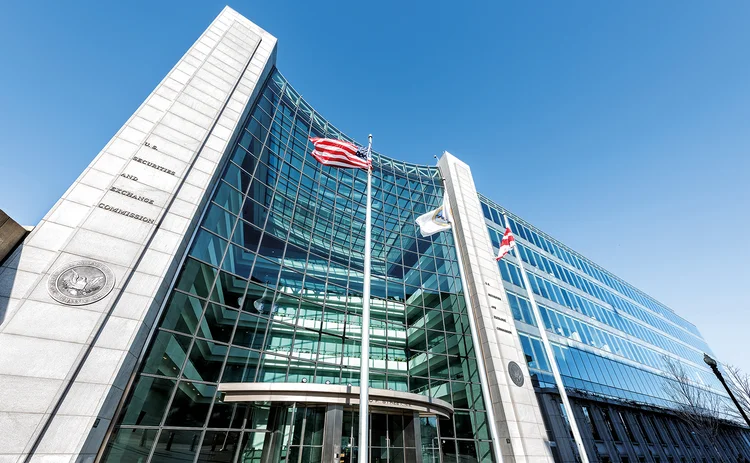SEC cyber rule could trigger more attacks, experts warn
Mandatory disclosure of cyber risks and attacks could help hackers

A new rule requiring US asset managers to disclose more information about cyber attacks could be a boon for hackers, critics of the proposal warn.
Investment firms must report any “significant cyber-security incidents” to the US Securities and Exchange Commission (SEC) within 48 hours and “promptly” inform clients of any breaches under a rule proposed by the regulator on February 9.
Cyber-security experts say these disclosures may expose compromised firms to further attacks when they are most vulnerable. “It can give cyber criminals an indication of how vulnerable an organisation is at a given time, and this is not what we would like to achieve,” says Attila Kiss, senior vice-president of non-financial risk at Nordea Asset Management.
The SEC defines a “significant cyber-security incident” as any breach that disrupts a firm’s critical operations or exposes information that could be used to harm the company, its clients or investors.
The SEC noted in its proposal that incident reports submitted to the regulator are confidential, and would “bolster the efficiency and effectiveness of our efforts to protect investors, other market participants, and the financial markets in connection with cyber-security incidents”.
However, some in the industry question whether the SEC can prevent this highly sensitive information from falling into the wrong hands. In 2016, the regulator’s Edgar filing system was infiltrated by hackers, who stole corporate earnings reports and traded ahead of their release, generating over $4 million in illicit profits.
In a comment letter dated April 11, the Securities Industry and Financial Markets Association (Sifma) called on the regulator to adopt “more robust language about how it will protect confidential data from being leaked to threat actors or members of the press”.
The SEC did not respond to requests for comment in time for publication.
It can give cyber criminals an indication of how vulnerable an organisation is at a given time
Attila Kiss, Nordea Asset Management
The proposed rule also requires investment firms to publicly disclose cyber risks and incidents in their brochures and promptly update them following an attack. Cyber experts worry these disclosures could send the wrong signal to investors, who might misinterpret the information, and could embolden would-be hackers.
The current industry practice is to provide clients directly affected by a cyber attack with as much information as possible about the breach.
“Institutions should share information with individual clients, but some of these signals are difficult to evaluate,” says Kiss. “It is difficult for non-specialists to understand what it means.”
Many financial firms are already subject to cyber incident reporting requirements from other regulators. A new cyber-security law passed by the US Senate on March 1 will require critical infrastructure providers, including financial entities such as clearing houses, to report material cyber-security incidents and ransomware payments to the US Cybersecurity and Infrastructure Security Agency within 72 and 24 hours respectively.
Cyber experts say they prefer to share information about cyber attacks through specialist agencies, such as Cisa and the Financial Services Information Sharing and Analysis Center, which alert other institutions to threats without making them public. The SEC proposal could force firms to publicly disclose an attack before they can fix the vulnerability, potentially inviting more attacks.
“If an attack is successful, it means there was a vulnerability that was unknown or not fully understood, and, by publicising it, you risk multiple attacks,” says a risk manager at a US regional bank.
“There are already means by which banks can share information in a private manner to help them prepare to defend themselves.”
Those familiar with the approach taken by other regulators say that they don’t usually ask firms to disclose vulnerabilities, and how these might be exploited, unless a breach has already taken place. The SEC proposal appears to go further in requiring investment firms to disclose information about their cyber risks and defences in public documents.
Ultimately, these public disclosures may not amount to much. The head of cyber security at a large international bank says firms generally disclose the minimum amount of information necessary to satisfy regulatory requirements, even if those disclosures are non-public. For instance, a bank may inform regulators that it sees identity and access management as areas for improvement, without detailing any specific weaknesses. “It’s the institution’s responsibility to not overdisclose,” this person says. “Hence the risk is on the part of the reporting entity.”
Only users who have a paid subscription or are part of a corporate subscription are able to print or copy content.
To access these options, along with all other subscription benefits, please contact info@waterstechnology.com or view our subscription options here: http://subscriptions.waterstechnology.com/subscribe
You are currently unable to print this content. Please contact info@waterstechnology.com to find out more.
You are currently unable to copy this content. Please contact info@waterstechnology.com to find out more.
Copyright Infopro Digital Limited. All rights reserved.
As outlined in our terms and conditions, https://www.infopro-digital.com/terms-and-conditions/subscriptions/ (point 2.4), printing is limited to a single copy.
If you would like to purchase additional rights please email info@waterstechnology.com
Copyright Infopro Digital Limited. All rights reserved.
You may share this content using our article tools. As outlined in our terms and conditions, https://www.infopro-digital.com/terms-and-conditions/subscriptions/ (clause 2.4), an Authorised User may only make one copy of the materials for their own personal use. You must also comply with the restrictions in clause 2.5.
If you would like to purchase additional rights please email info@waterstechnology.com
More on Emerging Technologies
This Week: Startup Skyfire launches payment network for AI agents; State Street; SteelEye and more
A summary of the latest financial technology news.
Waters Wavelength Podcast: Standard Chartered’s Brian O’Neill
Brian O’Neill from Standard Chartered joins the podcast to discuss cloud strategy, costs, and resiliency.
SS&C builds data mesh to unite acquired platforms
The vendor is using GenAI and APIs as part of the ongoing project.
Chevron’s absence leaves questions for elusive AI regulation in US
The US Supreme Court’s decision to overturn the Chevron deference presents unique considerations for potential AI rules.
Reading the bones: Citi, BNY, Morgan Stanley invest in AI, alt data, & private markets
Investment arms at large US banks are taken with emerging technologies such as generative AI, alternative and unstructured data, and private markets as they look to partner with, acquire, and invest in leading startups.
Startup helps buy-side firms retain ‘control’ over analytics
ExeQution Analytics provides a structured and flexible analytics framework based on the q programming language that can be integrated with kdb+ platforms.
The IMD Wrap: With Bloomberg’s headset app, you’ll never look at data the same way again
Max recently wrote about new developments being added to Bloomberg Pro for Vision. Today he gives a more personal perspective on the new technology.
LSEG unveils Workspace Teams, other products of Microsoft deal
The exchange revealed new developments in the ongoing Workspace/Teams collaboration as it works with Big Tech to improve trader workflows.







